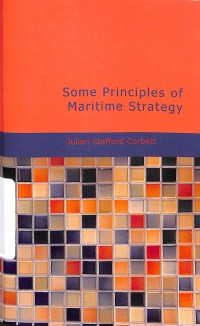FIC
Some principles of maritime strategy
This is a new and freshly published edition of this culturally important work, which is now, at last, again available to you.
Enjoy this classic work today. These selected paragraphs distill the contents and give you a quick look inside:
It discloses, in short, that naval strategy is not a thing by itself, that its problems can seldom or never be solved on naval considerations alone, but that it is only a part of maritime strategy-the higher learning which teaches us that for a maritime State to make successful war and to realise her special strength, army and navy must be used and thought of as instruments no less intimately connected than are the three arms ashore.
On the whole then, when men speak of the Napoleonic system they seem to include two groups of ideas-one which comprises the conception of war made with the whole force of the nation; the other, a group which includes the Cromwellian idea of persistent effort, Fredericks preference for the offensive at almost any risk, and finally the idea of the enemys armed forces as the main objective, which was also Cromwells.
The first value, then, of his theory of war is that it gives a clear line on which we may proceed to determine the nature of a war in which we are about to engage, and to ensure that we do not try to apply to one nature of war any particular course of operations simply because they have proved successful in another nature of war.
In it he classifies wars into nine categories according to their political object, and he lays it down as a base proposition That these different kinds of war will have more or less influence on the nature of the operations which will be demanded to attain the end in view, on the amount of energy that must be put forth.
Ketersediaan
Informasi Detail
- Judul Seri
-
-
- No. Panggil
-
TXT MR COR s
- Penerbit
- London : Bibliobazaar., 2006
- Deskripsi Fisik
-
277 p., ; illus : 21 cm
- Bahasa
-
English
- ISBN/ISSN
-
978-142-648-436-0
- Klasifikasi
-
MR
- Tipe Isi
-
-
- Tipe Media
-
-
- Tipe Pembawa
-
-
- Edisi
-
-
- Subjek
- Info Detail Spesifik
-
-
- Pernyataan Tanggungjawab
-
Julian Stafford Corbett
Versi lain/terkait
Lampiran Berkas
Komentar
Anda harus masuk sebelum memberikan komentar

 Karya Umum
Karya Umum  Filsafat
Filsafat  Agama
Agama  Ilmu-ilmu Sosial
Ilmu-ilmu Sosial  Bahasa
Bahasa  Ilmu-ilmu Murni
Ilmu-ilmu Murni  Ilmu-ilmu Terapan
Ilmu-ilmu Terapan  Kesenian, Hiburan, dan Olahraga
Kesenian, Hiburan, dan Olahraga  Kesusastraan
Kesusastraan  Geografi dan Sejarah
Geografi dan Sejarah